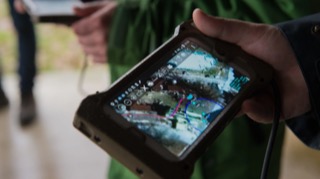In race with China, SOCOM must leverage private equity, say experts and VCs
“We are witnessing a cultural shift. Engineers want to work on problems for the DoD. We’re going to have an explosion of defense technology. Capital is following the engineers and following DoD opening of the aperture who want innovation,” said Alex Moore, partner at 8VC.

Demonstrators operate non-GPS enabled positioning, navigation and timing technology during a technical experimentation at Muscatatuck Urban Training Center, Ind., March 28, 2018. (Photo by U.S. Air Force Master Sgt. Barry Loo)
SOF WEEK 2023 — If US Special Operations Command wants to keep up with its counterparts in China, it’s got to leverage private equity to speed the integration of commercial tech, a panel of VCs and experts warned.
Addressing USSOCOM’s commander, Gen. Bryan Fenton, and delegates at the inaugural SOF Week conference in Tampa, Fla., last week, the panel described how the commercial market and small-medium enterprises (SMEs) continue to drive hi-tech development in defense, particularly in the areas of artificial intelligence, cyber and autonomy — all tech special operations forces needs to stay on the cutting edge.
“VCs are critical to this,” Joseph Felter, director of the Gordian Knot Center for National Security Innovation at Stanford University urged before suggesting commercial investment in US defense was “incomparable” to that of China.
RELATED: AI will be ‘key to every single thing,’ SOCOM acquisition chief says
Thomas Tull, founder and chairman of the US Innovative Technology Fund, said, “We can stand around and complain, but every day we do nothing, we are losing ground on our adversaries,”
And David Spirk, senior counselor at Palantir and former USSOCOM Chief Data Officer added, “If we can’t slow them down, we can accelerate ourselves.”
One issue, another panelist said, was the current high-cost of being a defense-focused SME.
“It still takes a billion dollars to ‘IPO’ a defense company. I want to get that down to $100 million and get more of these Anduril and Palantir type companies who have thousands of engineers and get the end-product to the Department of Defense,” said Alex Moore, partner at 8VC.
“We are witnessing a cultural shift. Engineers want to work on problems for the DoD. We’re going to have an explosion of defense technology. Capital is following the engineers and following DoD opening of the aperture who want innovation,” Moore stressed.
RELATED: The ‘morale challenge’ facing some special operators in the era of Great Power competition
Chairman of BridgingVoice, Peter Bloom said “small companies” must “reach scale to be effective” in support of the DoD. He also suggested some kind of DoD mentoring program could encourage these types of SMEs to grow.
“It would be really helpful for these small companies and no cost to DoD,” Bloom said.
Finally, Spirk also discussed how USSOCOM could assign SOF operators approaching the end of their career to SMEs to help them to “product match and understand real requirements and not what they’ve seen in the movies.”
One real-world example of the advantage commercial tech can provide, the panelists said, was how quickly the Ukrainian military has adopted “low end” tech that’s “good enough” to fight Russian troops more effectively.
The VCs highlighted space-based image intelligence (IMINT) and low earth orbit satellite communications in particular, suggesting USSOCOM should own and operate its own cheap and low-tech SATCOM network to benefit from organic voice, data, IMINT and signals intellitegence capability instead of relying upon larger, more slow-moving government agencies.
“Ukraine is absorbing the commercial space market as quickly as possible. We should use them as an example to understand how small companies can work with big ones on a war footing.
“Ukraine is going straight to these companies and getting imagery immediately instead of going through national agencies,” Bloom added. (Earlier in the week, USSOCOM acquisition executive Jim Smith said the command was working with the Space Development Agency on “SOF-peculiar” satellite payloads.)
Private capital could also be used to build the capability of international partners and allies, Spirk said — an idea reiterated by Tull, who said “going alone” in VC investment in defense would be difficult. Specifically, Tull highlighted cooperation with the ‘Five Eyes’ intelligence-sharing partners of the US, Australia, Canada, New Zealand and UK as well as Japan, South Korea and India.
Organizationally, Bloom suggested every US DoD Geographic Combatant Command (GCC) should have a Chief Technology Officer like Central Command’s Schuyler Moore.
“CENTCOM is the first GCC to have a CTO to act as a translator between technology and business. This can be easily extended to other GCCs at no cost,” Bloom said.